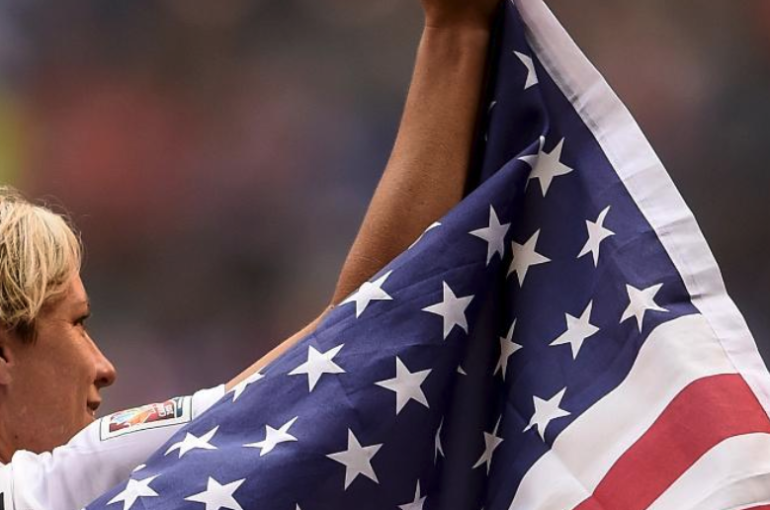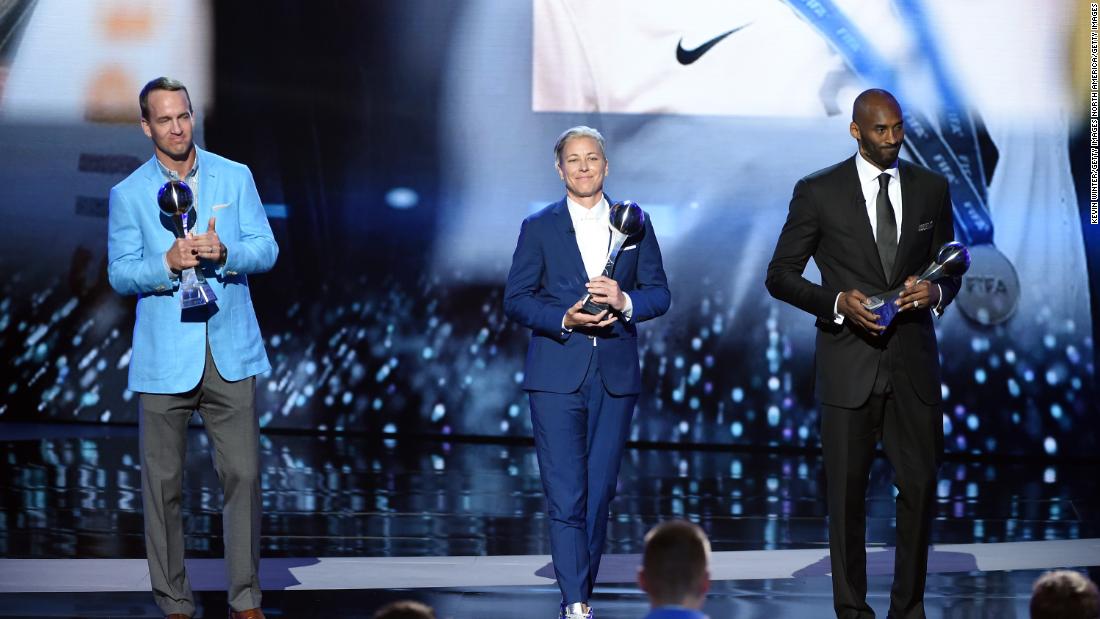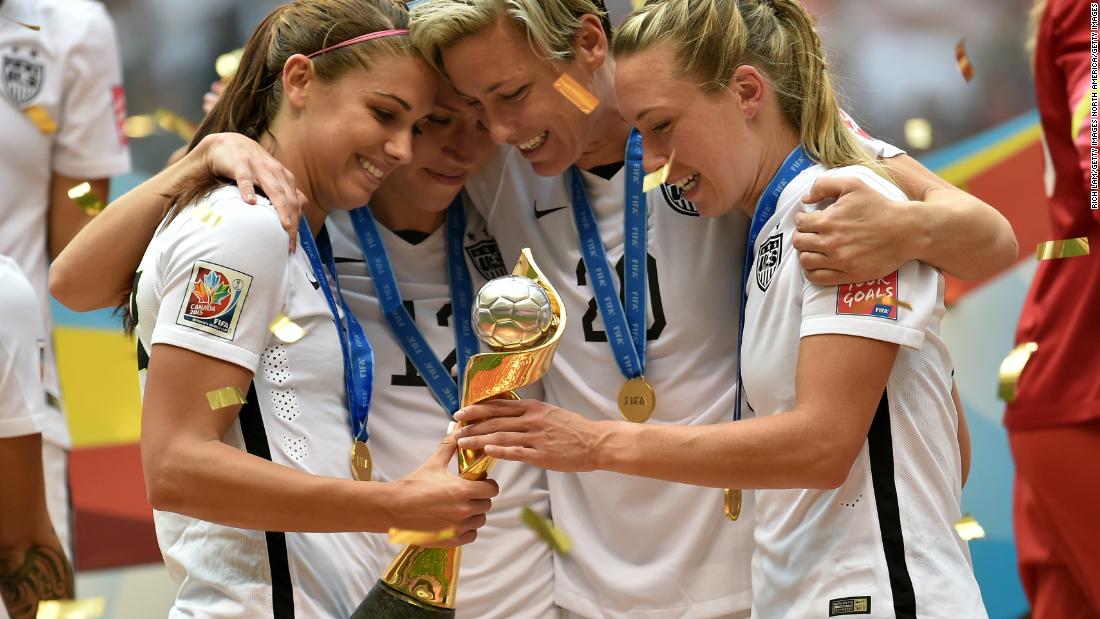‘I should have done more for equality when I was playing’ — Abby Wambach on mission to empower women

(CNN)Abby Wambach was once the world’s greatest female footballer and during those giddying goal-scoring, title-winning years she felt grateful. She was appreciative of any recognition, any respect. She did not make demands, did not push for more. But then her playing days ended and the American’s views changed.
“Just being grateful is not growth any longer,” an impassioned Wambach told CNN Sport as she talked about how equality can be achieved not just in sport but in society, too.
In the summer of 2016, a few months after retiring as the most prolific international goalscorer in her sport’s history, Wambach was on stage alongside Kobe Bryant and Peyton Manning being recognized as a sporting icon on one of those typically glittering awards night in Los Angeles.
The trio’s appearance had brought an audience of grandees to their feet and Wambach, looking out in wonder at the auditorium, was in awe. Here she was being celebrated on equal-footing with NBA and NFL superstars. Women had finally made it, she thought.
“But as I walked off stage I had a very interesting moment,” the 38-year-old explains.
“I realized how different retirements the three of us were walking into and we can all understand why and what that difference is: huge bank accounts.
“It got me thinking, ‘Why didn’t I do more? Why didn’t I push for better endorsements?’ If I had done more the experiences of the people behind me would have been better.
“I should have done more when I was in it because when you’re out of it you don’t have as much leverage to change things.”
Wambach ended her career with a record 184 goals in 256 appearances for the US, two Olympic gold medals, a world title and a FIFA World Player of the Year award. In 2015, Time magazine named her as one of the world’s 100 most influential people. But the former striker, regarded as one of the best there has ever been, only now realizes the power she had when at the summit.
“I didn’t understand it,” she says. “As I retired I realized I’m a person that is afforded more privilege than 95% of women footballers worldwide.
“I understand I was able to scratch a surface not many other women were. I understand now that I was offered a seat at the table and I didn’t do enough when I was in it. I didn’t demand enough when I was in it to make the lifestyle of all women around me better.
“I learned that lesson the hard way. That’s why I’m dedicating the rest of my life to making sure that people don’t have the experience when they retire, the fear of, ‘What the hell am I going to do?'”
Her perspective now changed, Wambach wants to reshape the world by spreading the message that women can be grateful and also demand more.
Female footballers, she says, should not genuflect to FIFA for increasing the prize money for this summer’s Women’s World Cup in France.
Though the sport’s world governing body has doubled the prize money from the previous tournament in 2015 (up from $15m to $30m), the gap between the funds handed out at the men’s World Cup in 2018 and the women’s World Cup this summer has increased.
Meanwhile, FIFA has given permission for major finals — the Copa America in Brazil and the CONCACAF Gold Cup in the US — to be held on the same day as July’s Women’s World Cup final.
“Having gratitude is a beautiful emotion but it can’t just stop there,” says Wambach, transferring the leadership skills honed during a 12-year playing career to a new chapter in her life.
“There was a time and place for it, but we’ve moved on beyond that as a society and women have to embrace their power.
“The rate in which they [FIFA] increase the women’s pay gap is indicative of the sexism that runs rampant through the walls of FIFA and it’s indicative of the respect they have for the women’s game.
“We’re not the step-daughter, we’re not the step-child or the step-parent, we’re not even the ugly aunt — we’re not even on the radar and that is how FIFA makes women’s football feel.”
In October, FIFA launched its first ever “global strategy for women’s football” and president Gianni Infantino said the body was “making progress,” describing the increase in prize money as a “significant step in the right direction.”
Wambach added: “Do I believe that women deserved to be paid the same as men? Yeah. Realistically, do I think that will happen for the women’s game in my lifetime? I don’t know, but I have to believe that we can get closer and we can be better.”
The New Yorker segues to last month’s controversial Ballon d’Or awards which received international attention for reasons that had little to do with the achievements of the first female recipient of the prestigious prize.
Instead, the world focused on a question posed by the co-host, DJ Martin Solveig, who asked history-maker Ada Hegerberg whether she could twerk.
An impassioned Wambach reflects: “Do I believe that man had the best of intentions when he started to interview her? Of course, I do. Do I believe he’s a bad human being? No.
“But I do think that that’s indicative of where we are as a culture and what we are used to expressing, used to thinking, used to feeling. That’s a societal mistake.
“Unfortunately, he had to learn a very hard lesson. The real issue isn’t what he said, it’s the fact he didn’t even know it would cause so much drama. He said it was a joke, but the problem is, though it might seem as a joke to you it’s not a joke to half the population, it’s offensive.
“We have to have more ownership for those moments in life. One woman’s victory is every woman’s victory. Also, one woman’s failure, when it comes to a moment of embarrassment, that was a fight for me too — that was a fight for all women, too.”
(READ MORE: CNN)




